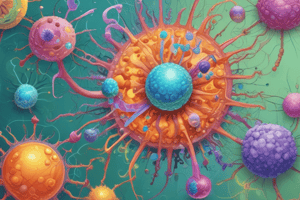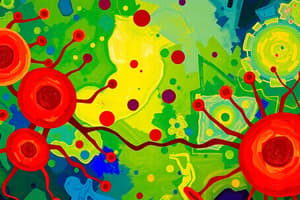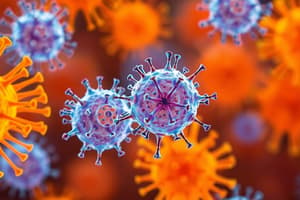Podcast
Questions and Answers
What is the main purpose of the immune system?
What is the main purpose of the immune system?
- To produce antibodies and B cell receptors
- To attack the body's own cells and proteins
- To fight foreign substances like bacteria and viruses (correct)
- To distinguish between self and non-self cells
What is the critical function of B cell receptors?
What is the critical function of B cell receptors?
- To produce antibodies and activate B cells
- To distinguish between self and non-self cells
- To bind to the body's own proteins and cells
- To bind to foreign substances like bacteria and viruses (correct)
What is unique about each B cell?
What is unique about each B cell?
- Their ability to produce antibodies and activate B cells
- Their unique set of B cell receptors and antibodies (correct)
- Their ability to distinguish between self and non-self cells
- Their ability to fight against only specific types of bacteria
How are B cell receptors and antibodies generated?
How are B cell receptors and antibodies generated?
What is the main challenge in understanding the immune system's function?
What is the main challenge in understanding the immune system's function?
What would happen if the immune system fails to distinguish between self and non-self cells?
What would happen if the immune system fails to distinguish between self and non-self cells?
What is the significance of the B cell receptor's binding to foreign substances?
What is the significance of the B cell receptor's binding to foreign substances?
Why is it important for the immune system to not attack the body's own cells?
Why is it important for the immune system to not attack the body's own cells?
What happens to B cells that recognize self-molecules in the bone marrow?
What happens to B cells that recognize self-molecules in the bone marrow?
Why is it possible for B cells to react to the body's own proteins?
Why is it possible for B cells to react to the body's own proteins?
Why doesn't a B cell die when it interacts with a bacteria it's meant to fight?
Why doesn't a B cell die when it interacts with a bacteria it's meant to fight?
What would happen if an antibody binds to all the insulin in the blood?
What would happen if an antibody binds to all the insulin in the blood?
Why is it important to eliminate B cells that react to self?
Why is it important to eliminate B cells that react to self?
What is the purpose of the weeding out of B cells that react to self proteins in the bone marrow?
What is the purpose of the weeding out of B cells that react to self proteins in the bone marrow?
What happens to T cells that react to self proteins in the thymus?
What happens to T cells that react to self proteins in the thymus?
Where do B cells get their unique antibody receptors?
Where do B cells get their unique antibody receptors?
What happens to a B cell that escapes the weeding out process in the bone marrow and reacts to a self protein?
What happens to a B cell that escapes the weeding out process in the bone marrow and reacts to a self protein?
How does the body figure out which B cells react to self?
How does the body figure out which B cells react to self?
Why does a B cell need a T cell to activate it?
Why does a B cell need a T cell to activate it?
What happens to B cells that bind to self-proteins in the bone marrow?
What happens to B cells that bind to self-proteins in the bone marrow?
Why is it equally applicable to talk about T cells in this context?
Why is it equally applicable to talk about T cells in this context?
Where does the interaction between the B cell and T cell usually take place?
Where does the interaction between the B cell and T cell usually take place?
What is the second mechanism of defense against autoimmune responses?
What is the second mechanism of defense against autoimmune responses?
What is the purpose of vetting B cells in the bone marrow?
What is the purpose of vetting B cells in the bone marrow?
What is the result if both a B cell and a T cell that react to self proteins escape their respective weeding out processes?
What is the result if both a B cell and a T cell that react to self proteins escape their respective weeding out processes?
What would happen if a B cell receptor binds to a self-protein in the bone marrow?
What would happen if a B cell receptor binds to a self-protein in the bone marrow?
Why is it not possible to completely prevent the creation of B cells that react to self?
Why is it not possible to completely prevent the creation of B cells that react to self?
What might happen if bacteria get into the bone marrow?
What might happen if bacteria get into the bone marrow?
What happens to B cells when they bind to something at this stage?
What happens to B cells when they bind to something at this stage?
Why is it not a major problem if bacteria get into the bone marrow?
Why is it not a major problem if bacteria get into the bone marrow?
What happens to the B cells that react to the bacterium and are already in the lymph nodes?
What happens to the B cells that react to the bacterium and are already in the lymph nodes?
What is autoimmune disease?
What is autoimmune disease?
What is the result of the autoimmune disease myasthenia gravis?
What is the result of the autoimmune disease myasthenia gravis?
Why do antibodies against the receptor on the muscle fiber cause problems?
Why do antibodies against the receptor on the muscle fiber cause problems?
What is the role of the receptor on the muscle fiber?
What is the role of the receptor on the muscle fiber?
What would happen if antibodies bind to the receptor on the muscle fiber?
What would happen if antibodies bind to the receptor on the muscle fiber?
What is the name of the autoimmune disease where antibodies bind to the receptor on the muscle fiber?
What is the name of the autoimmune disease where antibodies bind to the receptor on the muscle fiber?
Flashcards are hidden until you start studying
Study Notes
The Immune System and Self vs Non-Self
- The immune system's purpose is to fight foreign substances like bacteria and viruses, but it needs to distinguish between self and non-self to avoid attacking the body itself.
- The question of how the immune system knows not to attack itself is not obvious, and the answer lies in how B cells and T cells are generated and controlled.
B Cells and Antibodies
- B cells have unique B cell receptors that bind to foreign substances, which later become antibodies that help remove them from the body.
- Each B cell has a different receptor, generated at random through DNA shuffling, which means some might react to the body's own proteins and cells.
- This random generation process puts the body at risk of creating B cells and antibodies that react to self, which could lead to autoimmune diseases.
Preventing Self-Attack
- The body has mechanisms to prevent B cells that react to self from being activated:
- In the bone marrow, where B cells mature, the body keeps a selection of its own proteins to test the B cells' receptors. If a B cell binds to one of these proteins, it is killed.
- This process weeds out B cells that react to self, ensuring that only those that react to non-self proteins and cells are activated.
- The same process occurs for T cells, which mature in the thymus and are also tested for self-reactivity.
Second Mechanism of Defense
- Even if a B cell that reacts to self escapes the bone marrow, it usually needs a T cell that also reacts to self to activate it.
- This second mechanism of defense ensures that most autoimmune reactions are prevented, as both a B cell and a T cell need to escape their respective weeding-out processes to trigger an immune response.
What Can Go Wrong
- If bacteria infect the bone marrow, B cells that react to the bacteria might be killed, making it harder for the body to fight the infection.
- Autoimmune diseases can still occur when the body's mechanisms fail, leading to the immune system attacking the body's own cells and tissues.
- An example of autoimmune disease is myasthenia gravis, where antibodies attack the receptors on muscle fibers, preventing muscle activation and leading to muscle weakness.
Studying That Suits You
Use AI to generate personalized quizzes and flashcards to suit your learning preferences.




